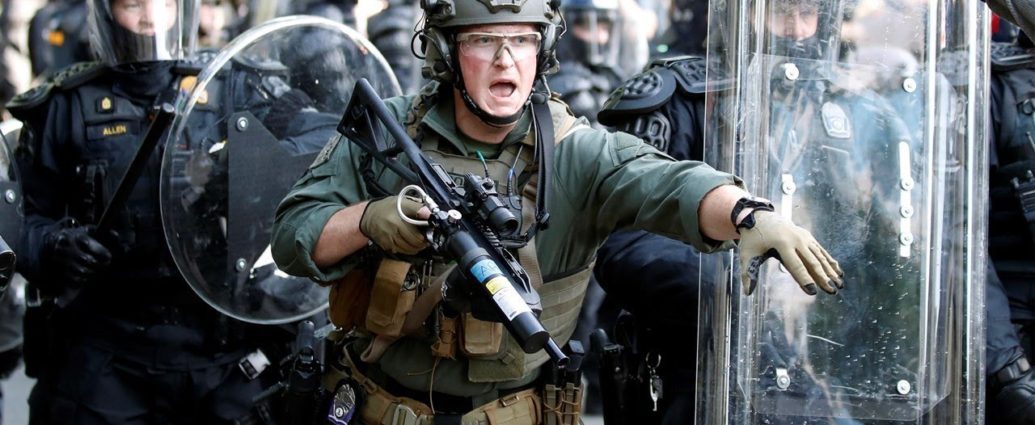What is ‘martial law’
In simple terms, martial law is the replacement of civil rule with temporary military authority in a time of crisis. While its imposition is rare, the United States does have several noteworthy instances where martial law came into play, including in times of war, natural disasters and civic disputes.
Though there is no precise definition of martial law, the precedent in the United States holds that under it, “certain civil liberties may be suspended, such as the right to be free from unreasonable searches and seizures, freedom of association, and freedom of movement. And the writ of habeas corpus [the right to a trial before imprisonment] may be suspended,” according to a legal journal.
Martial law can be declared by both the president and by Congress. The governor of a state may also declare martial law if it is included in that state’s constitution. However, Congress has never solely imposed it.
During the War of 1812, then-Gen. Andrew Jackson imposed martial law within his encampment at New Orleans, which he had recently liberated.
“Notorious examples include Franklin D. Roosevelt’s internment of U.S. citizens and residents of Japanese descent during World War II and George W. Bush’s programs of warrantless wiretapping and torture after the 9/11 terrorist attacks,” the Atlantic reported. “Abraham Lincoln conceded that his unilateral suspension of habeas corpus during the Civil War was constitutionally questionable, but defended it as necessary to preserve the Union.”
But martial law is not without limits. The Posse Comitatus Act, passed on June 18, 1878, stopped federal troops from supervising Confederate state elections during Reconstruction. It originally applied only to the Army, but has since been amended to include the Defense Department and the other service branches. That act essentially prohibits troops from carrying out domestic law enforcement actions such as searching and seizing property and dispersing crowds. National Guard units, however, as they operate under state-rule, are exempt from the Posse Comitatus Act.
In extreme circumstances, there is an exception: the Insurrection Act, which allows the use of active-duty or National Guard troops for federal law enforcement in cases when “rebellion against the authority of the U.S. makes it impracticable to enforce the laws of the U.S. by the ordinary course of judicial proceedings,” according to U.S. Northern Command.
One of the more relevant cases, at least as it may pertain to National Guard units being called up to aid in the coronavirus pandemic, is that of the John Warner National Defense Authorization Act for Fiscal Year 2007. The bill, signed into law in 2006, gave the president the power to take command of National Guard units under the guise of martial law without the approval of state governors until its expiration a year later, creating a precedent for such action.
Among all of the COVID-19 panic, people have been throwing around the term “martial law” an awful lot. What does martial law actually mean? Why is everyone talking about it?
Only the President of the United States has the power to call for martial law at the federal level. When he does, the military takes control of the law and the people rather than the civilian government, to include elected officials.
State governors also have the power to declare martial law within their state’s borders, such as following a natural disaster. However, the current talk of the social media town is federal martial law, so we’ll focus on that.
During martial law, civil liberties as we know them essentially go out the window.
Habeas corpus, which is basically protection against unlawful imprisonment, along with protection against unreasonable searches, freedom of movement, freedom of speech, and other freedoms that we as Americans enjoy, can be suspended.
The dreaded curfews can also be implemented and one may be arrested for a violation.
Why would we ever allow someone in our government to implement such a policy? While it is extreme, there is a purpose. During extreme times of unrest, citizens exchange certain freedoms for their safety.
Martial law is most often declared when a country or region’s law and order is deteriorating.
Additionally, a president may declare martial law during a state of emergency, though that is less common. During a state of emergency on its own, civilian rights are also limited, except without power being handed over to the military.
When a situation arises where the US is in a state of emergency for something other than a natural disaster, such as the spread of a new and potentially deadly virus brought to us by an enemy communist regime, the president may also implement martial law to maintain or restore order in the nation an prevent the further spread of said virus.
We have already begun seeing local states of emergencies declared around the nation as fear of the COVID-19 virus sets in. When this happens, resources become available to the governments that aren’t normally available, which then are used to combat whatever led to the emergency issuance (the virus).
This is when the governments can issue orders such as placing limits on gathering size, curfews, shutting down businesses, etc. This is a state of emergency.
Martial law, then, is when the military comes in to enforce those orders.
Last week, President Trump declared a national emergency, which opens up access to billions of dollars, and also activates the Federal Emergency Management Agency (FEMA).
The President said that the declaration will “unleash the full power of the federal government”, which is what is needed to assist our country in such a detrimental time. Having the funding to help businesses, workers, the elderly, etc., is extremely important.
Because of the extreme nature of what is occurring right now, with trying to minimize the threat and damage of the virus, many have begun speculating that martial law will soon follow the national emergency.
To be clear, just because the President doesn’t come out in the media and announce that he’s declaring martial law, that doesn’t necessarily mean it isn’t happening.
Some, in fact, argue that a version of martial law has already begun. In the past, police and military have trained together in multiple operations, such as the Jade Helm drills in Texas. We all know how a certain group of people feel when their community’s police are exposed to “militarization.”
Before people fear the enacting of martial law, it’s important that we understand why a president would set such restrictions on the nation.
Contrary to much of the media’s ideals that President Trump is foaming at the mouth to gain this type of power, it’s actually not a great thing for him either.
This isn’t China- a dictator gaining power through complete control doesn’t have the same advantages. America thrives on business, capitalism, freedom, and our President is no different.
That said, during a time of unrest or a growing pandemic with no end in sight, there are some things that people can expect to occur that it’s important to know about.
First, the aforementioned curfews.
We have already seen in Florida during Spring Break that some people do not react well to curfews. However, this isn’t just a power move because government officials don’t like people having fun. This is in an effort to control the spread of COVID-19.
If martial law is enacted and curfews along with it, the reason is also an effort to control the spread, but also for the safety of the military members and the citizens they may encounter.
Similarly, travel would likely be restricted to only essential travel status. It’s possible that travel check points would also be established.
If it came to this point, the military would also begin to ration food, medicine and supplies.
Gone would be the opportunity for people to selfishly hoard enough supplies to last them four lifetimes. If this happens and people need 18 rolls of toilet paper for a two-week period, then they’re going to have to reuse their own rolls.
As discussed earlier, habeas corpus would be suspended, which would bring about the need for military tribunals. This is essentially a small court made of military members who quickly determine the guilt and fate of a potential offender.
Where local police would consider something like, say, a curfew violation, a minor offense, under martial law, the military could impose fairly strict punishments for such acts.
If an offender were to be accused of terrorist acts, well let’s just say said offenders wouldn’t be benefiting from any far-left ideals of bail or criminal justice reforms. Antifa would be forced to either stop acting like third world country, lawless animals, or face military consequences
At the risk of causing any far-left activists to faint, the military may very well bring in some type of detention camps in order to keep suspected terrorist or those harboring them out of society.
They would likely get the military tribunal type of trial, which means no more allowing basically any illegal immigrant out on the street.
Criminal illegal immigrants would not be dealt with kindly. Certainly they would not be dealt with in the sanctuary-loving manner, which is to say not at all.
Then, of course, there’s the fear of the military showing up at your door to take your guns. This is why Second Amendment supporters are so against the registering of guns.
If all of the above occurs and chaos ensues, people will freak out. If there are food rations and someone feels like they deserve more food, where do you think they will go for that?
Burglaries, robberies, violence have the potential to get out of control and if someone comes to my house to try to take food out of my babies’ mouths, they will damn sure be met with my unregistered assault rifles.
We have the Second Amendment so that our citizens can protect themselves from tyranny. And this, my friends, is what we are looking at. But it’s not because of the military.
People who occupy both the far-left and the far-right end of the spectrums are taking to the internet and posting doomsday concerns for the enactment of martial law.
“Hide your guns!” they say. “You’re never going to see your family again!” they cry. “We are going to die!’ they posit.
Well, yes actually. If you are a tyrant, if you take to the streets and loot and riot when the military is doing its best to keep our communities safe and prevent the spread of this virus, then yes. You may get your guns taken away for everyone’s safety.
You may never see your family again. You may die. But really isn’t that true of any violent criminal?



